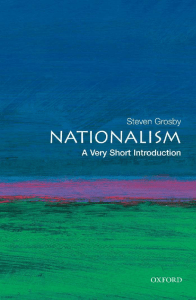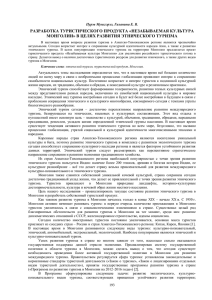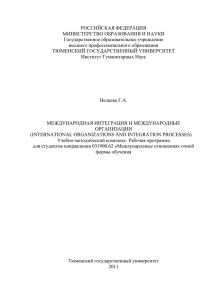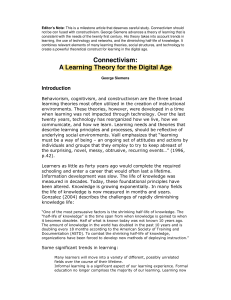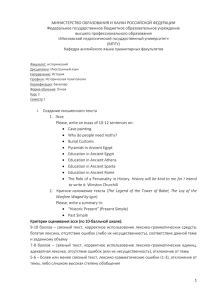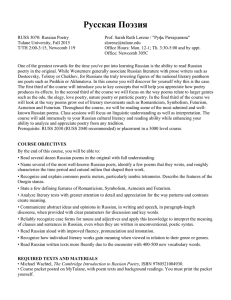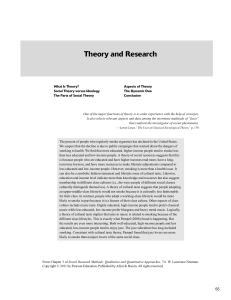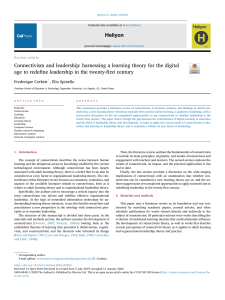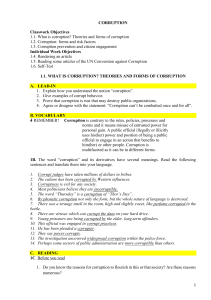РОССИЙСКАЯ ФЕДЕРАЦИЯ МИНИСТЕРСТВО ОБРАЗОВАНИЯ И НАУКИ Государственное образовательное учреждение высшего профессионального образования
реклама
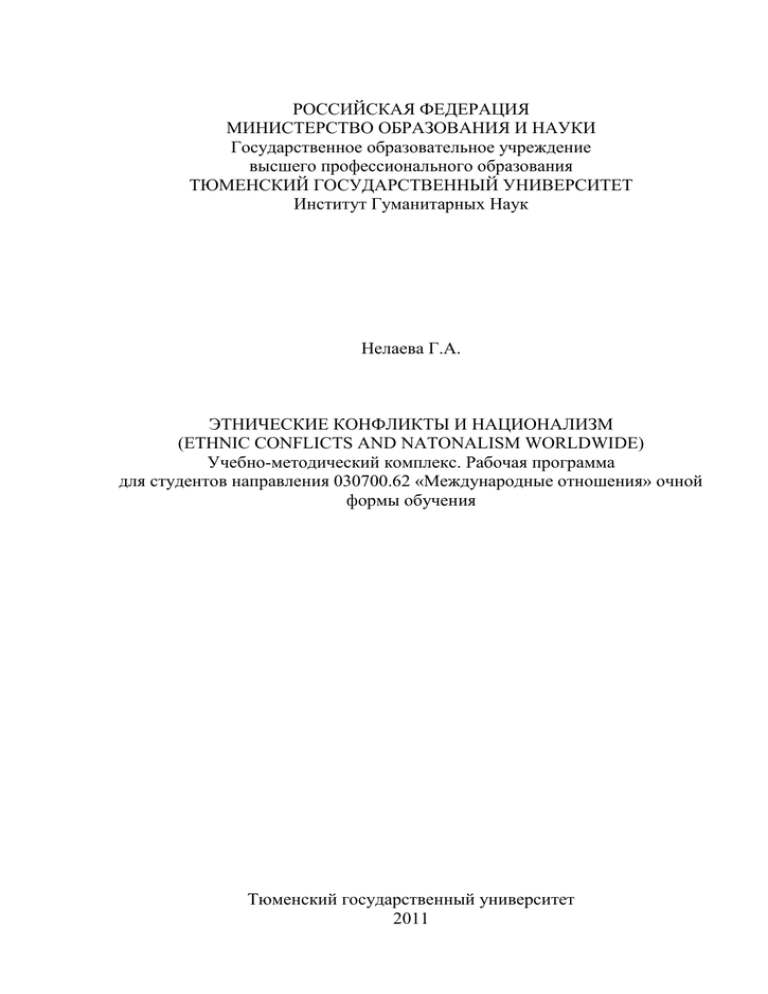
РОССИЙСКАЯ ФЕДЕРАЦИЯ МИНИСТЕРСТВО ОБРАЗОВАНИЯ И НАУКИ Государственное образовательное учреждение высшего профессионального образования ТЮМЕНСКИЙ ГОСУДАРСТВЕННЫЙ УНИВЕРСИТЕТ Институт Гуманитарных Наук Нелаева Г.А. ЭТНИЧЕСКИЕ КОНФЛИКТЫ И НАЦИОНАЛИЗМ (ETHNIC CONFLICTS AND NATONALISM WORLDWIDE) Учебно-методический комплекс. Рабочая программа для студентов направления 030700.62 «Международные отношения» очной формы обучения Тюменский государственный университет 2011 Нелаева Г.А. Этнические конфликты и национализм (Ethnic Conflicts and Nationalism Worldwide). Учебно-методический комплекс. Рабочая программа для студентов направления 030700.62 «Международные отношения» очной формы обучения. Тюмень, 2011, 17 стр. Рабочая программа составлена в соответствии с требованиями ФГОС ВПО с учетом рекомендаций и ПрООП ВПО по направлению и профилю подготовки. Рабочая программа дисциплины (модуля) опубликована на сайте ТюмГУ: Этнические конфликты и национализм (Ethnic Conflicts and Nationalism Worldwide) [электронный ресурс] / Режим доступа: http://www.umk3.utmn.ru., свободный. Рекомендовано к изданию кафедрой новой истории и международных отношений. Утверждено проректором по учебной работе Тюменского государственного университета. ОТВЕТСТВЕННЫЙ РЕДАКТОР: Баязитова Г.И., к.и.н., доцент © Тюменский государственный университет, 2011. © Нелаева Г.А., 2011. 3 1. Пояснительная записка 1.1. Цели и задачи дисциплины (модуля) Данный курс посвящен изучению этнонациональных проблем, их особенностям. Цели и задачи курса: изучить причины возникновения этнонациональных проблем в период после окончания «холодной войны», рассмотреть закономерности развития и возможности предотвращения конфликтов, проанализировать основные теоретические подходы к изучению конфликтов, выделить основные тенденции и трансформацию конфликтов. Внимание будет уделяться рассмотрению конкретных конфликтов, таких как конфликты на пост-советском пространстве (Карабах, Абхазия, Приднестровье, конфликты на Северном Кавказе). Теории национализма и этнических конфликтов будут рассмотрены в начале курса с целью дать студентам представление об основных направлениях изучения современных конфликтов. Курс читается на английском языке. В учебно-методическом комплексе имеется программа лекционного курса, вопросы для семинарских занятий, задания для самостоятельной работы студентов, список источников и литературы по изучаемым темам. 1.2. Место дисциплины в структуре ООП бакалавриата Б1 Дисциплины по выбору. Курс «Этнические конфликты и национализм» связан с такими изучаемыми в бекалавриате дисциплинами, как «Конфликтология», «Религия в мировой политике», «Теория международных отношений». Для успешного освоения курса студент должен иметь представление о типах современных конфликтов, разбираться в теориях международных отношений, уметь применять теории к анализу конкретных ситуаций, разбираться в особенностях деятельности международных организаций. Изучение данного курса будет полезно при освоении таких последующих дисциплин как «Европейские институты безопасности», «Теория и методика исследований в области международных отношений». 1.3. Компетенции выпускника ООП бакалавриата, формируемые в результате освоения данной ООП ВПО. В результате освоения ООП бакалавриата выпускник должен обладать следующими компетенциями: ОК-6, ОК-10, ОК-16, ОК-25, ОК-26. В результате освоения дисциплины обучающийся должен: Знать особенности анализа социально значимых проблем и процессов (ОК-10); Уметь: понимать движущие силы исторического процесса, роль насилия и ненасилия, место человека в историческом процессе, политической организации общества (ОК-16); Владеть: стремлением к саморазвитию, повышению своей квалификации и мастерства (ОК-6); готовностью к совершенствованию общества на принципах гуманизма, свободы и демократии (ОК-25); способностью адаптироваться к условиям работы в составе многоэтничных и интернациональных групп (ОК-26). Требования Эссе по заданным темам (3): 1-3 страницы, 1.5 интервал, Times New Roman. Эссе, не сданные в срок по неуважительной причине, не засчитываются! Эссе, выполненные без 4 учета основных требований (структура: введение, основная часть, заключение; грамотно оформленные источники и литература; сноски) также не засчитываются! Работа на занятии. Студенты должны посещать все занятия и принимать активное участие в дискуссиях. Презентация. Студентам предлагается подготовить выступление по предложенным темам (см. раздел «Список тем докладов и самостоятельных работ»), либо по любой другой теме после согласования ее с преподавателем, на 10 минут (макс). Данный вид работы допускает работу в группе. Контрольная работа. 0 -60 баллов = «незачтено» 61-100 баллов- «зачтено». Структура и трудоемкость дисциплины. Семестр 7. Форма промежуточной аттестации: зачет. Общая трудоемкость дисциплины составляет 2 зачетные единицы 72 часа. 2. 3. Тематический план. Таблица 1. Виды учебной работы и самостоятельная работа, в час. 1. 2. 3. 4. 5. 6. 1. 2. 3. Самостоятельн ая работа* 2 Модуль 1 Trends in warfare. Ethnic conflicts after World War II. Defining a “nation”, nationalism”, and the nation-state. Theories of nationalism: classic primordialism and beyond. Modernization theories of nationalism. Constructivist theories of nationalism. Elite-based theories. Theories of civil strife. Всего Модуль 2 Europe: the birthplace of nationalism? Yugoslavia as a casestudy. Comparative analysis of nationalism in the Middle East. North and Sub-Saharan Africa. Семинарские (практические) занятия* 1 Итого часов по теме В интерактивной форме Лекции* Тема недели семестра № 4 5 7 3 1 2 2 2 3 2 4 2 5 2 6 2 12 7-8 8 Итого количест во баллов 9 10 1 3 2 0-2 1 5 2 0-9 1 3 2 0-4 1 5 2 0-2 1 3 2 6 1 6 5 24 8 0-2 0-23 4 2 1 7 2 0-6 9 2 2 1 5 10 2 1 3 2 2 0-4 0-2 2 0-7 5 4. 1. 2. 3. 4. 5. 6. African Union. North America: building the American nation. South and Central America: state formation, civil wars and revolutions. Всего Модуль 3 Russia and the former Soviet Union. Caucasus: the divided region. The Armenian-Azerbaijani conflict. Georgia’s break-away republics: Abkhazia, South Ossetia. Civil war termination. Wrapping up the course. Всего Итого (часов, баллов): Итого в интерактивной форме 11 2 1 3 2 10 4 4 18 6 12 13 14 15 2 2 2 2 2 2 2 1 1 6 4 5 3 2 2 16 17 2 4 14 36 20 2 2 8 18 1 1 8 18 5 5 28 2 0-14 0-29 0-4 0-2 0-9 0-2 2 0-2 0-29 0-48 0 – 100 6 20 Таблица 2. Виды и формы оценочных средств в период текущего контроля контрольная работа ответ на семинаре собеседование презентация 1. Trends in warfare. Ethnic conflicts after World War II. 2. Defining a “nation”, nationalism”, and the nationstate. 3. Theories of nationalism: classic primordialism and beyond. 4. Modernization theories of nationalism. 5. Constructivist theories of nationalism. Elite-based theories. 6. Theories of civil strife. Всего 1. Europe: the Письменные работы Устный опрос Итого количество баллов эссе № темы 0-2 0-2 0-2 0-2 0-2 0-2 0-5 0-9 0-4 0-2 0-2 0-2 0-2 0-4 0-2 0-2 0-23 0-4 0-2 0-6 6 birthplace of nationalism? Yugoslavia as a case-study. 2. Comparative analysis of nationalism in the Middle East 3. North and Sub-Saharan Africa. African Union. 4. North America: building the American nation. South and Central America: state formation, civil wars and revolutions. Всего 1. Russia and the former Soviet Union. 2. Caucasus: the divided region. 3. The ArmenianAzerbaijani conflict. 4. Georgia’s break-away republics: Abkhazia, South Ossetia. 5. Civil war termination. 6. Wrapping up the course. 0-2 0-2 0-2 0-10 0-5 0-2 0-2 0 0-2 0-2 0-7 0-14 0-29 0-4 0-2 0-2 0-2 0-2 0-5 0-9 0-2 0-2 0-2 0-2 0-2 0-4 0-2 0-23 0-29 Всего Итого 0-48 0 – 100 Таблица 3. Планирование самостоятельной работы студентов № Модули и темы Модуль 1 1.1 Trends in warfare. Ethnic conflicts after World War II. Виды СРС обязательные дополнительные Table: types of warfare (literature Неделя семестра Объем часов Кол-во баллов 1 1 0-2 7 1.2 Defining a “nation”, nationalism”, and the nationstate. 1.3 Theories of nationalism: classic primordialism and beyond. 1.4 Modernization theories of nationalism. 1.5 Constructivist theories of nationalism. Elite-based theories. 1.6 Theories of civil strife. review). Definitions of basic terms (literature review). Comparative analysis of main themes in primordialism (literature review). Modernization concepts (literature review). Comparative table of constructivist and elite-based approaches. Find examples of application of primordialist terms in the media. Criticism of elite theories (literature review). 2 1 0-9 3 1 0-4 4 1 0-2 5 1 0-4 6 1 Всего по модулю 1: Модуль 2 2.1 Europe: the birthplace of nationalism? Yugoslavia as a case-study. 2.2 Comparative analysis of nationalism in the Middle East. 2.3 North and Sub-Saharan Africa. African Union. North America: building the American nation. South and Central America: state formation, civil wars and revolutions. 2.4 6 Comparative analysis of the development of nationalism in Western Europe. Comparative analysis of the development of nationalism in the Middle Eastern states. Report on African conflicts. 7-8 1 0-6 9 1 0-2 10 1 0-7 Report on Latin American states: specifics of nationalism. 11 1 0-14 Всего по модулю 2: Модуль 3 3.1 Russia and the former Soviet Union. 3.2 Caucasus: the divided region. 3.3 The Armenian-Azerbaijani conflict. 3.4 Georgia’s break-away republics: Abkhazia, South Ossetia. 3. 5 Civil war termination. 0-2 0-23 4 Report on contemporary dilemmas in Russia. Media review: current state of affairs in the Caucasus. International organizations as peace-makers in the Karabakh conflict. Media review: current state of affairs in the Georgian conflicts. Comparative analysis of ways of conflict resolution (with 0-29 Overview of main leaders. 12 2 0-4 Overview of main leaders. 13 2 0-2 Overview of main leaders. 14 1 0-9 Overview of main leaders. 15 1 0-2 Overview of main leaders. 16 1 0-2 8 3.6 examples). Current conflicts and ways of conflict settlement (analysis). Wrapping up the course. 17 Всего по модулю 3: ИТОГО: 1 0-29 8 18 0-48 0-100 4. Разделы дисциплины и междисциплинарные связи с обеспечиваемыми (последующими) дисциплинами № п/п 1. 2. 5. Наименование обеспечиваемых (последующих) дисциплин Европейские институты безопасности Теория и методика исследований в области международных отношений. Темы дисциплины необходимые для обеспечиваемых (последующих) дисциплин 1 2 3 4 5 6 7 X X X X изучения 8 X X X 9 X X Содержание дисциплины. Lecture 1: Trends in warfare. Ethnic conflicts after World War II. Post Cold War security. Types and causes of intra-state wars. Topics: basic definitions (state, armed conflict, ethnic conflict). Types and causes of war. Can we offer a typology of wars historically? What distinguishes wars fought in the second part of the 20th century? Characterizing post-Cold War environment. What accounts for the dramatic increase in civil conflict in the post Cold-War environment? Self-determination: a right to succeed or a violation of inviolability of state borders? Lecture 2: Defining a “nation”, “nationalism”, and the nation-state. Historical development of nationalism. Related phenomena: patriotism, ethnicity. Topics: how do we know when we are looking at instances of nationalism? The semantic development of the concept “nation”’. Competing definitions of a “nation”: Ernest Renan, Karl Deutsch, Walker Connor, Josep Llobera. Can we come up with our own definition? Defining “nationalism”. Historical development of nationalism (brief overview). Patriotism, national symbols. What is nationalism good for? Lecture 3: Theories of nationalism: classic primordialism and beyond. Topics: ethnicity as the key theme. The importance of common descent, historical depth, emotional bonds and feelings of attachment. Primordialist views of a nation. Joseph Stalin and his definition of a nation. Comparing Stalin and Geertz. Criticizing primordialism. Lecture 4: Modernization theories of nationalism. Criticizing modernization theories. Topics: emergence of nations as a result of social structural transformations in Europe in the 14-16th centuries. The distinction between Marxist and non-Marxist modernists. The importance of economy, state and mass culture. Karl Deutsch, Ernest Gellner, Eric Hobsbawm, 9 Liah Greenfeld. What is a modern state? Transformation of religion, emergence of a civil society. Civic versus ethnic nationalism. Criticizing modernization theories. Lecture 5: Constructivist theories of nationalism. Benedict Anderson: “Imagined communities”. Nationalism as a pursuit of power. Elite-based theories. Minority bargaining theory. Topics: Benedict Anderson: “Nation is an imagined political community- and imagined as both inherently limited and sovereign.” Emergence of vernacular languages and print capitalism leading to the rise of national consciousness. The role of elites and popular mobilization. Minority bargaining: why do followers follow? Lecture 6: Theories of civil strife: 1) psychological theories; 2) security dilemma explanations (Posen); 3) commitment problem (Fearon). Natural resources and violence. Secessionist conflicts. Topics: “Banality of Evil” (Hanna Arendt), dynamics of dehumanization, “neurotic character structure”. Posen: “security dilemma” (arises when groups of people suddenly find themselves newly responsible for their own security), collapse of imperial regimes and the consequences of anarchy. Security as the main concern of the states. James Fearon: commitment problem (“arises when two groups find themselves without a third party that can credibly guarantee agreements between them”). Greed and grievance as reasons for civil war. “Minority at risk” (Tedd Gurr). Samuel Huntington and “clash of civilizations”. Lectures 7-8: Europe: the birthplace of nationalism? The idea of Europe as a geographical entity and a cultural community. Comparing France, Germany and the UK. Eastern Europe: collapse of the Habsburg Empire. Communist attempts at internationalism, 19451989. Post 1989: re-emergence of nationalism. Yugoslavia as a case-study. Topics: “Western Europe” as a value-laden concept. The UK, Germany, and France: comparative analysis of the emergence of nationalism. The role of the Reformation, Renaissance, capitalism and science. Structural and cultural factors in the development of nationalism in Western Europe. Current challenges: separatism, managing multicultural societies. Eastern Europe: common features, struggles for independence and self-determination. Fault lines in Eastern Europe (religion, empires, economic development). WWII and national socialism. Borders, minorities, revolutions. Current challenges: EU accession, Roma policies. Yugoslavia: why was it created? Why did it collapse? The role of elites, economic factors, ethnic hatreds in fuelling the Yugoslav war. Kosovo. Lecture 9: Comparative analysis of nationalism in the Middle East. The origins of Arabic nationalism. Palestine. Zionism and its origins. “Kurdish question” (Turkey, Iran, Iraq, Syria, Lebanon). Topics: defining the region. Nation-making in the Middle East. The dissolution of the Ottoman Empire. Kemal Atatürk- the modernizer of Turkey. Nationalism and religion. Arab nationalism and the role of intellectuals. Zionism. Israeli-Palestinian conflict and stages of conflict transformation. Kurds: the stateless people. Lecture 10: North Africa (the Maghreb world): Algeria, Morocco, Tunisia, Western Sahara, Mauritania: conquest and liberation struggles. Sub-Saharan Africa: nationalists and independence. OAU (The Organization of African Unity). Post-Cold War realities. Topics: Africa- a diverse mosaic of languages, cultures and communities. Berlin conference (1884-1885) as a source of persisting rivalries. Pioneers of African nationalism (Edward Wilmot Blyden, Kwame Nkrumah). De-colonization. Military coups, dictatorships and 10 the role of the military. Post- Cold War realities. Rwanda, Sierra Leone, Liberia as examples of violent conflicts. Lecture 11: North America: building the American nation. Slavery and the Civil War. “The Melting Pot”. Canadians: the shadow of Americans? South and Central America: state formation, civil wars and revolutions, guerrillas, dictatorships, imperialism, indigenous peoples. Topics: the birth of Canadian and American nations. The role of history: American revolution, the ideology of “manifest destiny”. Immigrants. Slavery and the civil war. “The Melting Pot” (US) and “mosaic” (Canada). Quebec: a distinct society? Latin and Central America: nation-building processes, wars of independence, the role of the military, dictatorships. Lecture 12: Russia and the former Soviet Union. Roots of modern nationalism. The church and the nation. 19th and 20th centuries: searching for the soul of the nation. Marxism and nationalism. Soviet era: Soviet nationality policies. Post-Soviet realities. Topics: what makes the process of nation-formation different from Western and Eastern Europe? What makes it similar? 14th century and attempts to reunite the lands around Moscow. The idea of Moscow as the “third Rome”. Ivan IV and consolidation of Russian lands. The role of the church in nation-formation. Petrovian Russia. The idea of a nation in the 18th century. The coming of modernization. Marxism. Nationalism in the Soviet era. Post-soviet dilemmas. Quest of identity in modern-day Russia. Lecture 13: Caucasus: the divided region. Russia’s war with Chechnya. Conflicts in the North Caucasus. Topics: defining the region. Ethno-linguistic map. Diversity of religions, ethnic groups, languages, cultures. Caucasus as a security complex. The role of historical events in nationformation. North Caucasus in the Soviet time. Chechnya: 1991-1994 de facto independence. The role of elites (Johar Dudaev, Boris Yeltsin). Second Chechen war: radicalization of the society. The Ingush-Ossetian conflict over Prigorodny Region. Lecture 14: The Armenian-Azerbaijani conflict. Topics: historical overview of Armenian-Azeri rivalries over Karabakh. Late 1980swhat explains the resort to violence? What is the role of international organizations and individual states in conflict resolution? What can be possible solutions to the Karabakh dispute? Lecture 15: Georgia’s break-away republics: Abkhazia, South Ossetia. Topics: Abkhazia, South Ossetia, Ajaria: why different paths? The role of territory, history, economy in creating opportunities for separatism. The role of third parties in the region. Lecture 16: Civil war termination. Peace-keeping and power-sharing. Partition theory. Negotiated settlements: why do conflicts resume after the settlement? Who should negotiate the settlement? Wrapping up the course. Topics: why are civil wars difficult to end? What are common ways of ending civil wars? Separation and partition: advantages and challenges. Third-party involvement. What traits should a mediator have? How important are third party guarantees? Power-sharing (Arendt Lijphart). Can power-sharing be effective in situations of extreme violence? The role of international and regional intergovernmental organizations in conflict resolution. 6. Планы семинарских занятий. 11 Seminar 1: Analyse civil wars fought after WWII and those fought earlier. What are the major differences? Which factors can explain those differences? Patriotism-a “good nationalism”? Why do you think ideology is important? What role do national symbols play? Can you think of examples when ideology and national symbols were actively used in nation-building? Give examples of civil wars fought after WWII. What do they have in common? Is it possible to group them? How is nationalism linked to war? Seminar 2: What is a nation? Which arguments are more convincing: those of primordialism or modernization theory? Is primoridialist theory of nationalism relevant to the study of ethnic conflict? If so, how exactly is it important? Give examples. Give examples of conflicts explained in the media using primordialist or modernization arguments. Which explanations do you find more convincing? Seminar 3: Which theory, constructivist or elite-based, is better suited for study of nation and nationalism and for study of ethnic conflict? To what extent can they explain why and when a conflict starts? Abner Cohen (1974): “Ethnicity is a communal organization that is manipulated by an interest group in its struggle to develop and maintain its power”. Do you agree? (Elite-based theory): is it possible to predict which aspects of identity will be manipulated? Psychological theories of civil strife: is there a necessary correlation between optimism and going to war? Security dilemma: how realistic do you think it is to assess the military capabilities of another state? What measures can be taken to avoid/resolve security dilemma? Can you think of examples of security dilemma rather than those discussed in class? Which theory of civil strife seems more convincing to you? Explain. Seminar 4: European Union as a “melting pot”: is there “European identity”? Has the EU weakened nationalist sentiments in its constituencies? The Spanish Basques and Irish Protestants: why do conflicts persist over time? External national homeland (Brubaker): what stance should it adopt toward states in which coethnics reside? How can policies of the external national homeland affect relations between the nationalizing state and the minority, ethnically related to the external homeland? Russia’s policies in the Balkans in the 1990s: why so inconsistent? Seminar 5: Israeli-Palestinian conflict: identify major stages in conflict transformation. Which factors can account for these shifts? Nation-making in Israel: the role of history and “promised land”. Algeria: the role of monolingualism and religion in nation-building. The “Kurdish question”: is there a solution to it? The role of the ethnic discourse in contemporary African context and the impact of this discourse on conflict-settlement in Africa. The road to Baghdad: any exit strategy in sight? Seminar 6: 12 Quebec francophones: a linguistic struggle or a quest for sovereignty? “Rogue states”: who decides? What strategies have been used to deal with “rogue states”? What distinguishes conflicts in Latin America from conflicts elsewhere? What are the similarities? Seminar 7: Tensions within Russia’s constituencies in the post-Soviet environment. Present day nationalist marches: an anomaly or a consequence of incoherent nationality policies? State-building in Chechnya in the pre-1994 period. Why unsuccessful? Ingushetia and Chechnya: what can explain different attitude to independence? Primordialism at stake. Seminar 8: 1. Russia’s policy options in Abkhazia and South Ossetia. 2. Transdnestria: is there a sustainable solution to the conflict? 3. EU impact in conflict settlement in the post-Soviet conflicts Overall analysis of the post-Soviet conflicts. 7. Учебно - методическое обеспечение самостоятельной работы студентов. Оценочные средства для текущего контроля успеваемости, промежуточной аттестации по итогам освоения дисциплины (модуля). Темы презентаций (темы 1-16): 1) Transformation of warfare and wars of “new kind.” 2) Debates over the definition of “nation.” 3) Primordialism and its main proponents. 4) Modernization: compare views of main thinkers. 5) Elite theory and its application. 6) Rationalist theories of nationalism: how can they be applied to the study of ethnic conflict? 7) Environmental factors and civil strife. 8) War in the Balkans: main phases of the conflict, role of the international community in conflict resolution. 9) Conflicts in the post-Soviet space: comparative analysis. 10) Russia and its current challenges in constructing the post-Soviet identity. 11) Ways of conflict resolution. 12) Role of international organizations and mediation in conflict settlement. Темы эссе (темы 1-16): Short essays on the assigned topics (1-2 pages, Times New Roman, 12, 1.5 space) 1) Compare the views of prisordialists and modernists. Which views do you find more relevant for analyzing civil wars? Nationalism? 2) Book review: article. 3) Survey on how well young people know about tensions and ethnic conflicts in the postSoviet states. Контрольные вопросы к экзамену 1) Define “nation”, “ethnicity”, “ethnic conflict”, “nation-state”. How can you characterize wars fought in the second half of the 20th century? How are they different from wars fought earlier? 2) Explain the difference between primordialism and modernization. Which theory do you think is more relevant for the study of ethnic conflicts? Give examples. 13 3) Benedict Anderson and “imagined communities”. How is it relevant for the study of nationalism? Of ethnic conflict? 4) Elite-based theories of nationalism. Explain and support by examples. 5) Rationalist theories of nationalism: security dilemma, commitment problem, minority bargaining. How can they explain conflicts on the post-Soviet space? 6) Choose any Western European country and analyze stages of development of nationalism. Can the European Union be a stabilizing factor? How? 7) The Balkans: choose either Bosnian war (1992-1995) or Kosovo (1999-until present). Explain the complexity of the problem. Which actors are involved? What are the prospects of peace in the area? 8) Middle East: the Kurdish question or Israeli-Palestinian conflict. Analyze stages of development of the conflict, suggest solutions. 9) North or South America. What can characterize the development of nationalism? What important events/dates/names can you mention? 10) African conflicts: what distinguishes them from conflicts fought elsewhere? What are the similarities? 11) Choose any post-Soviet conflict. Analyze its causes, explain what actors are involved, analyze the role of Russia. 12) Choose any conflict in the 1990s which was terminated and analyze the way it was terminated. Why do you think this particular way of conflict resolution can be regarded as effective/ineffective? 13) Russia: historical development of nationalism, current dilemmas. 8. Образовательные технологии. Round table (темы 14-16): Katherine Verdery (Nationalism and National Sentiment in postSocialist Romania. 52 Slavic Review 2, Summer 1993, ps. 179-203) mentioned three reasons for nationalism relating to post-Socialist Eastern Europe: a) history: the national idea historically played an important role; “nation” in its ethnic meaning had entered into people’s political and social identities; b) Soviet Union and Yugoslavia were federations, the principle of national difference was constitutionally enshrined. Leaders of nationalities held power in their republics, weakening at the center empowered national elites. Thus, the form of federal organization reinforced rather than weakened ethnic difference; c) competition for scarce resources tightened ethnic ties: the use of ethnicity as a basis for personal connections. How accurate is this model in the Central and Eastern European context? Can you think of other factors that can explain nationalism in the post-socialist CEE? How do groups which did not have a republic on their own fit into this model? (Jews, Roma) What about minorities in the respective republics? 9. Учебно-методическое и информационное обеспечение дисциплины (модуля). 9.1. Основная литература: УЧЕБНИКИ - Ачкасов В. А. , Ланцов С. А. Мировая политика и международные отношения. Учебник. М., 2011. - Батырь В. А. Международное гуманитарное право. Учебник для вузов. М., 2011. - Богатуров А. Д. Системная история международных отношений. Том второй. События 1945-2003 годов. М.: Культурная революция, 2007. - Ланцов С. А. (ред.) Политическая конфликтология. М.: Питер, 2008. 14 - Тураев, В.А. Этнополитология: учеб. пособие/В.А. Тураев.- М.: Логос, 2004. - Шабаев, Ю.П. Этнополитология: учеб.пособие для студентов Вузов/ Ю.П. Шабаев, А.П. Садохин.- М.: Юнити-Дана, 2005. - Цыганков П.А. (ред.) Международные отношения: теории, конфликты, движения, организации. М.: Альфа-М, Инфра-М, 2008. ХРЕСТОМАТИИ - Encyclopedia of Nationalism. Volumes I-II. 2001. Academic Press. ЛИТЕРАТУРА - Anderson, Benedict. 1991. Imagined Communities: Reflections on the Origins and Spread of Nationalism, 2nd ed. London: Verso. - Breuilly, John. 1994. Nationalism and the State. University of Chicago Press. - Brubaker, Rogers. 1996. Nationalism Reframed: Nationhood and the National Question in the New Europe. Cambridge: Cambridge University Press. - Gellner, Ernest. 1983. Nations and Nationalism, Ithaca, N.Y.: Cornell University Press. - Gurr, Ted Robert. 2000. People Versus States. Washington DC: United States Institute of Peace. - Holsti, Kalevi. 1996. The State, War and the State of War. Cambridge: Cambridge University Press. - J. Hutchinson and Anthony D. Smith (eds.) 1994. Nationalism: A Reader, Oxford University Press, excerpted writings by Renan, Stalin, and Geertz, pp. 15-21; 29-34. - Jenne, Erin. 2004. A Bargaining Theory of Minority Demands: Explaining the Dog that Did not Bite in 1990s Yugoslavia. 48 International Studies Quarterly: 729-754. - Fearon, James. 1998. “Commitment Problems and the Spread of Ethnic Conflict,” in David Lake and Donald Rothchild (eds.) The International Spread of Ethnic Conflict: Fear Diffusion and Escalation. Princeton, N.J.: Princeton University Press. - Kaufmann, Chaim. Spring 1997. “Possible and Impossible Solutions to Ethnic Civil Wars,” in Brown et. al. (eds.) Nationalism and Ethnic Conflict. - Lijphart, Arendt. 1990. “The Power-Sharing Approach,” in Joseph Montville (ed.) Conflict and Peacemaking in Multiethnic Societies. Lexington, MA: Lexington Books. - Slezkine, Yuri. Summer 1994. “The USSR as a Communal Apartment, or How a Socialist State Promoted Ethnic Particularism,” Slavic Review 53:2. - Tishkov, Valery. 1997. Ethnicity, Nationalism and Conflict in and after the Soviet Union. The Mind Aflame. London: SAGE Publications. - Van Evera, Stephen. 1997. “Hypotheses on Nationalism and War,” in Michael Brown, et. al. (eds.) Nationalism and Ethnic Conflict. - Wallensteen, Peter and Margareta Sollenberg. 1996. “The End of International War? Armed Conflict 1989-95,” 33 Journal of Peace Research: 3. - Кольев, А.Н. Нация и государство: теория консервативной реконструкции/А.Н. Кольев.М.: Логос, 2005. - Калхун, Крейг. Национализм: пер. с английского/К. Калхун.- М.: Территория будущего, 2006. 9.2. Дополнительная литература: - Никитин, М.Д. Черная Африка и британские колонизаторы: столкновение цивилизаций/М.Д. Никитин; Саратов. Межрегион. Ин-т Общественных Наук.- Саратов: Научная книга, 2005. 15 - Кавказский регион: пути столкновения: докл. междунар. науч. конф./ред. Ю.Г. Волков.Ростов н/Д.: Изд-во РГУ, 2004. - Трофимов, Е.Н. Национальная политика России (законодательный аспект)/Е.Н. Трофимов; Рос. Академия гос. службы при Президенте РФ.- М.: Изд-во РАГС, 2007. - Нации и национализм: пер. с англ./Б.Андерсон, О. Бауэр, М. Хрох и др.- М.: Праксис, 2002. - Фарес И. М. Ближний Восток: путь к миру и согласию/И. Фарес.- М.: Известия. 2005. - Израиль и ближневосточный конфликт в исследованиях молодых российских ученых: [сб]: пер. с англ./Русское о-во друзей Европейского ун-та в Иерусалиме, Тирош-труды по иудаике; ред. Сост. А. Симонова, М. Членов.- М.: [б.п.] Вып. 1: от Кемп-Дэвида до интифады Аль-Акса. 2005. ПЕРИОДИЧЕСКИЕ ИЗДАНИЯ Foreign Affairs Foreign Policy International Organization Pro et Contra Азия и Африка сегодня (АиАс) Аналитические доклады МГИМО Аналитические записки МГИМО Дипломатический вестник Коммерсантъ Космополис Международная жизнь (МЖ) Международная политика Международные процессы (МП) Мировая экономика и международные отношения (МЭиМО) Новая и новейшая история Россия в глобальной политике Эксперт 9.3. Программное обеспечение и Интернет – ресурсы: Organization for Security and Cooperation in Europe: www.osce.org Euronews: euronews.net Radio Free Europe: http://www.rferl.org Carnegie Foundation (Moscow): www.carnegie.ru Institute for Analysis of Global Security: www.iags.org Caucaz Europenews: http://www.caucaz.com European Union Institute for Security Studies: www.iss-en.org International Crisis Group: www.intl-crisis-group.org Organization for Security and Cooperation in Europe: www.osce.org Stockholm International Peace Research Institute: www.sipri.org Crimes of War Project: www.crimesofwar.org Операции ООН по поддержанию мира: www.un.org/Depts/dpko Institute for War and Peace Reporting: www.ipr.net Международный Трибунал по Бывшей Югославии: www.un.org/icty Международный Трибунал по Руанде: www.ictr.org Международный Комитет Красного Креста: www.icrc.org 16 Международный Уголовный Суд: www.icc.int Coalition for International Justice: www.wcw.org Amnesty International: www.amnesty.org Human Rights Watch: www.hrw.org The Stanford Center on Conflict and Negotiation: www.stanford.edu/group/sccn Carnegie Endowment for International Peace: www.ceip.org UN Peacekeeping Operations: www.un.org/Depts/dpko Peace Research Institute, Oslo: www.prio.no Conflict Research Consortium: www.colorado.edu/conflict The Clingendael Conflict Research Unit: www.clingendael.nl The Joan B. Kroc Institute for International Peace Studies: www.nd.edu Сайт информационного агентства «Regnum»: http://www.regnum.ru Сайт «Политическая наука»: http://www.politnauka.org Электронный каталог и библиотека по гуманитарным наукам: http://www.humanities.ru Фонд «Евразия»: http://www.efcentralasia.org/ru Обзор Центральной Азии: http://www.c-asia.org Центральная Азия и Кавказ: http://www.ca-c.org/indexr.shtml Форум «Политика On-line»: http://forum.politikaonline.ru Сайт Российской ассоциации международных исследований (РАМИ): http://www.convention2006.risa.ru Эксперт: www.expert.ru It’s also recommended to consult regularly international news sources: New York Times Washington Post The Times (London) ArabNews (Saudi Arabia) Daily Nation (Kenya) Le Monde (France) Dawn (Pakistan) The Hindu (India) Jerusalem Post World Press Review People’s Daily (China) Straits Times (Singapore) Deutsche Welle (Germany) El Pais (Spain) 10. Технические средства и материально-техническое обеспечение дисциплины (модуля). Курс предполагает использование: 1. Компьютер и компьютерный мультимедийный проектор 2. Интернет для поиска информации по современным проблемам мировой политики и международных отношений. 3. Информационные и обучающие компакт-диски с данными по политологии, истории, географии др. 17
